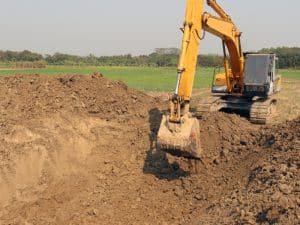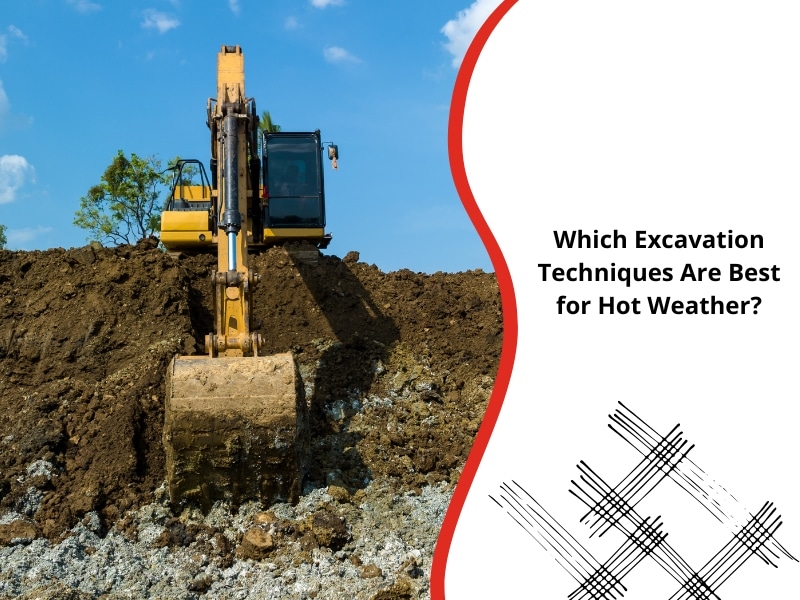Excavation is an essential part of any construction or site preparation project. Still, when the temperature rises, it can introduce several challenges. Working in hot weather requires careful planning and the use of specific techniques to ensure both the safety of workers and the success of the project. This article will explore the impact of hot weather on excavation, the best techniques to minimise heat-related risks, and how to ensure both efficiency and safety during these conditions.
How does hot weather affect excavation projects?
Hot weather significantly impacts excavation projects by affecting the soil, equipment, and overall safety of workers. When temperatures soar, the ground can become excessively dry and hard, making it more difficult for excavation machinery to dig through. Furthermore, the heat can lead to an increased risk of accidents and injury, dehydration, and fatigue among workers. It can also affect the productivity of the project, causing delays or halting work until conditions become manageable.
What are the challenges of excavation in extreme heat?
Excavation in extreme heat comes with several challenges, including:
- Dry soil and harder ground: High temperatures can dry out the soil, making it compact and challenging to dig through.
- Increased machinery stress: Machinery tends to overheat more quickly in hot conditions, which can lead to mechanical failures and delays.
- Worker health and safety risks: Prolonged exposure to high temperatures can lead to dehydration, heat exhaustion, and even heatstroke for workers.
- Dust and debris: Hot, dry conditions cause more dust and debris on the worksite, potentially reducing visibility and making the site more hazardous.
- Slower work rates: The extreme heat may require more breaks for workers, leading to slower project completion times.
Which excavation techniques help minimise heat-related risks?
Several excavation techniques can help minimise the risks associated with hot weather. Here are some effective strategies:
- Moistening the soil: Watering the soil helps reduce dust and prevents excessive compaction, making excavation easier.
- Shading work areas: Using tarps or shade structures protects workers from direct sunlight and reduces heat exhaustion risks.
- Hydration stations: Providing cool water throughout the day prevents dehydration and keeps workers alert.
- Timing of work: Scheduling excavation during cooler parts of the day, like early mornings or late afternoons, helps avoid peak heat.
- Using smaller equipment: Smaller equipment can offer more precision and reduce strain on larger machines that may overheat in the sun.

How can soil conditions impact excavation techniques during hot weather?
Soil conditions can change dramatically during hot weather, directly affecting how excavation is carried out. Some of the ways soil conditions are impacted by heat include:
- Dry soil: Arid soil becomes rigid and compact, challenging machinery to break through.
- Loose, dusty soil: Dry soil creates dust, reducing visibility and posing respiratory risks.
- Uneven ground: Hot weather can cause uneven soil, creating instability and tipping risks for machinery.
- Soil cracking: Extreme heat can lead to cracks in the soil, making excavation more challenging and potentially damaging machinery.
Adjusting excavation practices based on soil conditions is crucial to ensure the work is carried out efficiently and safely in hot weather, helping to prevent soil collapse during excavation.
What are the best equipment choices for excavation in hot weather?
The right equipment is crucial for excavation in hot weather to prevent overheating and ensure efficiency. Here are key tips for selecting the best equipment:
- Well-maintained machines: Regular servicing ensures peak performance, reducing overheating or breakdowns.
- Heavy-duty excavators: Built to handle harsh conditions and manage increased soil compaction.
- Dust-control attachments: Help minimise airborne dust, which is common in hot weather.
- Air-cooled engines: Better suited for extreme heat, as they are less likely to overheat compared to water-cooled engines.
- Lightweight equipment: Using lighter equipment can reduce strain on operators and machinery, ensuring smoother operations in hot conditions.
How can excavation techniques ensure worker safety in high temperatures?
Ensuring worker safety during excavation in hot weather is crucial to prevent heat-related illnesses like dehydration or heatstroke. Here are some techniques to keep workers safe:
- Adequate rest breaks: Schedule breaks in shaded or cool areas to prevent overexertion.
- Protective clothing: Provide lightweight, breathable clothing, hats, and sunscreen.
- Hydration monitoring: Track water intake to prevent dehydration and maintain focus.
- Heat-resistant equipment: Use equipment designed to withstand high temperatures, reducing the risk of breakdowns.
- Training Workers on Heat Safety: Educating workers on recognising the signs of heat-related illnesses and providing first aid training can be a lifesaver.

What safety precautions should be taken when excavating in high temperatures?
Excavating in hot weather requires specific safety precautions to ensure that workers are protected from heat-related health issues. These measures include:
- Providing shade: Using portable shade structures or working in shaded areas can reduce the risk of heat exhaustion.
- Monitoring workers: Supervisors should regularly check in with workers to ensure they are staying hydrated and not showing signs of heat stress.
- First aid training: Ensuring that all workers are trained in recognising and responding to signs of heatstroke or dehydration.
- Keeping the work area cool: Using water sprays or fans can help keep the work area cooler, especially for teams working with heavy equipment.
Implementing these essential excavation safety measures is critical to protecting workers and ensuring a safe excavation process.
How do different excavation techniques impact site preparation in hot conditions?
Excavation techniques can have a significant impact on site preparation, particularly in hot weather. Proper preparation can help mitigate some of the issues that arise from high temperatures. Here are some factors to consider:
- Soil moisturisation: Applying water to the site before excavation can make digging more manageable and reduce the risk of soil compaction.
- Strategic scheduling: Excavation tasks can be scheduled around the temperature to reduce the stress on workers and equipment.
- Efficient site layout: Effective site layout planning can prevent unnecessary disruption to the ground, ensuring a smoother process in the heat.
By considering these factors, reliable excavation services can ensure that site preparation goes smoothly, even in extreme heat.
Ensuring successful excavation in hot weather
Excavating in hot weather presents unique challenges, but with the proper techniques and precautions, risks can be minimised and productivity maintained. By choosing the right equipment, managing soil conditions, and prioritising worker safety, excavation projects can continue smoothly, even under the harshest conditions.
For clients in Newcastle, Hunter Valley, Sydney, and the Central Coast, Watson Demolition & Site Services offers expert excavation, earthmoving, and site preparation services. With years of experience and a strong commitment to safety, we provide reliable solutions for residential, commercial, and industrial projects. Contact Watson Demolition & Site Services today for a consultation and free quote on your excavation needs.

